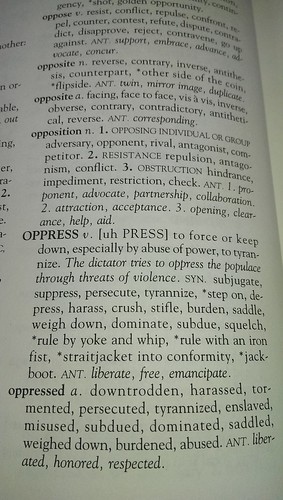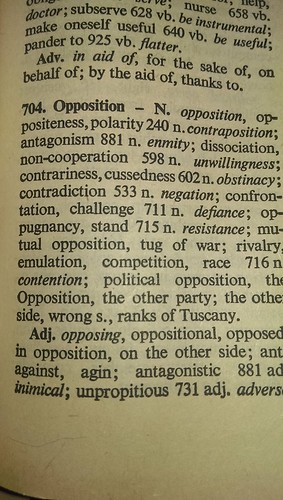Before anyone tells me that the plural of “thesaurus” should “thesauri” rather than “thesauruses”, which is what I’d have thought myself, apparently it can be either, according to the Oxford dictionary.
I find a thesaurus to be indispensable on those occasions when the most appropriate word is on the tip of my tongue, but all I can bring to mind is a word that means something similar. (It’s interesting to me that such words are called “synonyms”, ie words which mean the same as each other. I don’t believe there are any synonyms, or not more than a few anyway. Even words that appear to mean the same thing have subtly different meaning in most cases.)
A really good thesaurus will give not only synonyms, but synonyms in the form of phrases as well as words.
Compare the following, for instance.
 The word "opposition" in a thesaurus
The word "opposition" in a thesaurus
In the first, several synonyms for “opposition” are given, but the second is far richer, giving phrases like “the other side” as well. The second is Roget’s Thesaurus published by Penguin. It’s not as straightforward to use as some of the others available, but it’s much better in my opinion. I like it even better than the Oxford version, or indeed any other online thesaurus I’ve tried, because it is so comprehensive. (If you wish to purchase it and help to bolster my meagre finances at the same time, you can do so by clicking on rogets thesaurus.)
 The word "opposition" in Penguin's Roget's thesaurus
The word "opposition" in Penguin's Roget's thesaurus
What I like about Roget’s too is that it gives the context for the different synonyms also, which helps you choose the right word. For instance, opposition in a political sense may be summed up in the word “challenge” or is variations, whereas the word “cussedness” would be completely misleading in that context.
Thesauruses (or thesauri) give antonyms too, making them an excellent multi-purpose resource for the writer.

